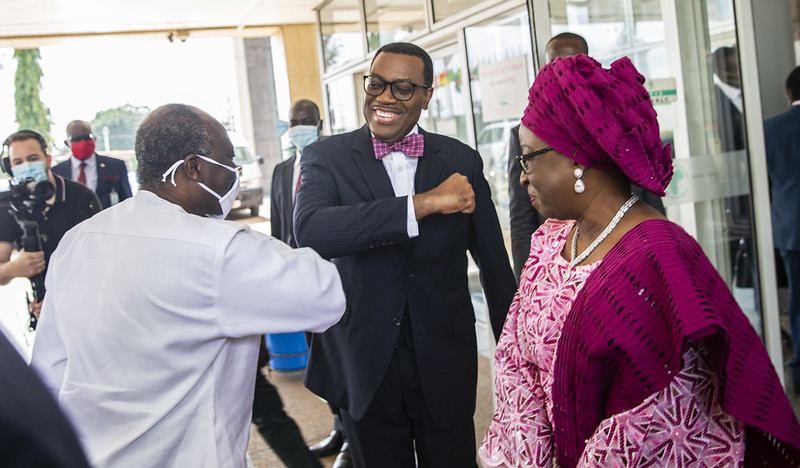Dr Adesina’s renewed mandate and challenges ahead
The Board of Governors of the African Development Bank at its meeting in Abidjan, capital of the Republic of Cote d’Ivoire, on August 27, 2020 unanimously renewed the appointment of the incumbent President of the bank, Nigeria’s Dr Akinwuni Adesina, for another five-year term. It was a mere formality as Dr Adesina was the only […]

Adesina after being sworn as president of AfDB for the second five-year tenure
The Board of Governors of the African Development Bank at its meeting in Abidjan, capital of the Republic of Cote d’Ivoire, on August 27, 2020 unanimously renewed the appointment of the incumbent President of the bank, Nigeria’s Dr Akinwuni Adesina, for another five-year term.
It was a mere formality as Dr Adesina was the only candidate on the ballot.
Adesina pledges quality deliverables to Africa through AfDB
Adesina sworn in for a second term as president of AfDB
Up until a few weeks ago, Dr Adesina’s reappointment appeared uncertain as he was the target of months of sustained campaign by whistle-blowers within the bank who levelled 16 allegations bordering on his running of the bank.
Although the bank’s internal processes found him not culpable in all the charges, a powerful bloc among its shareholders led by the United States of America, still baulked at the acquittal of Dr Adesina.
It insisted that the entire process that exonerated him was faulty and called for its review by an independent panel of international experts on issues of corporate integrity.
The bank thus appointed a panel composed and headed by Mary Robinson, a former Prime Minister of the Republic of Ireland and Leonard Murphy, former Vice President of Integrity at the World Bank and Chief Justice of the Supreme Court of Gambia.
The panel, in its reports on the investigation it carried on the internal processes of the AfDB, not only endorsed the procedures, but also gave Dr Adesina a clean bill of health on the charges directed at him, paving the way finally for his reappointment.
Dr Adesina’s reappointment as President of the AfDB should come as good news to all Africans and friends of Africa who desire to see it continue with the positive strides that Dr Adesina was making as he steered activities of the bank.
It is instructive to note that even when he was undergoing investigation on the allegations against him, there were no questions as to the achievements the bank had made through his initiative and leadership.
Dr Adesina had increased the bank’s capital base from 98 billion dollars to about 200 billion dollars.
He also initiated and pursued a five-pronged programme aimed at addressing the existential challenges in the critical areas of African development.
Similarly, in the wake of COVID-19, the bank had made available a 10 billion dollar lifeline to enable African countries to cope with the effects of the pandemic.
Dr Adesina has also initiated a move towards decentralising the activities and accessibility to the bank by opening up zonal offices in Africa.
All these have not gone unnoticed and the international financial rating agencies, Standard and Poor, and Moodys respectively, gave the bank the deserved rating of AA+ and declared that it had a solid future.
In the end, Dr Adesina’s sterling performance attested to by reports from independent watchdogs, coupled with the solid support he garnered from the African bloc in the bank led by President Muhammadu Buhari of Nigeria and some of Africa’s friends, proved too difficult to ignore.
Interestingly, America, the leader of the powerful bloc which tried to stymie the reappointment of Dr Adesina, joined not only in his overwhelming endorsement at the meeting of the Board of Governors but also publicly pledged to support and work with him in the positive efforts of repositioning the bank.
While the reappointment of Dr Adesina is a victory worth celebrating, both for him and the bank, we must however point out that it brings forth challenges and the need for caution.
Among the challenges is that having opened new vistas of progress in the bank’s activities and engagements in Africa, it must not just sustain the tempo but also aim to increase it.
It is no gainsaying that Africa is a continent in dire need of development and whatever can be done to help achieve that and open up its vast potentials must be encouraged.
As one of the drivers towards attaining that objective, AfDB under Dr Adesina must ramp up its game.
Against the background of the issues he faced and surmounted before he was reappointed, Dr Adesina must also be cautious about happenings in the bank.
It was announced that five Nigerian companies doing business with it have been blacklisted owing to identified untoward practises.
Although this has no direct or any link whatsoever to him, as a Nigerian however, it must have weighed in Dr Adesina’s mind.
If anything at all, this serves to show that although things are now on an even keel with him at the AfDB, he will need to be more vigilant as those who never want him reappointed for a second term may not relent in their desire to see him out.
